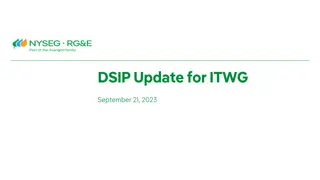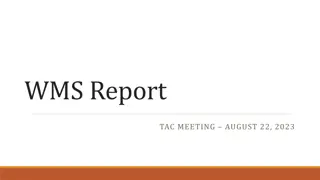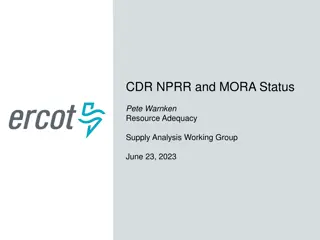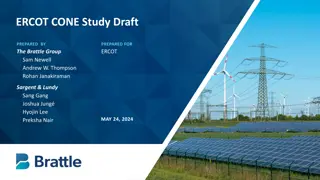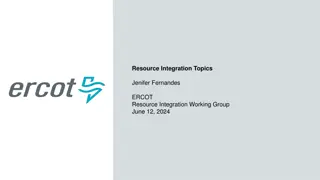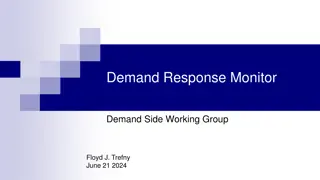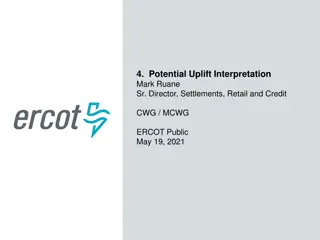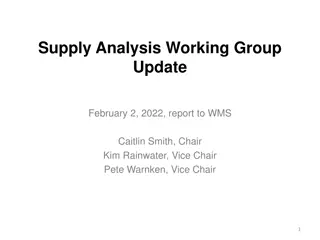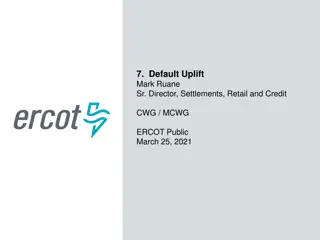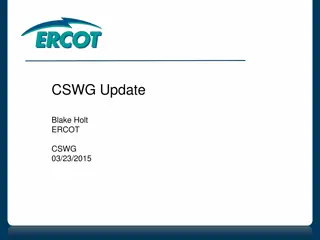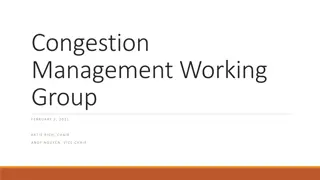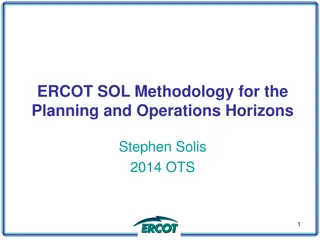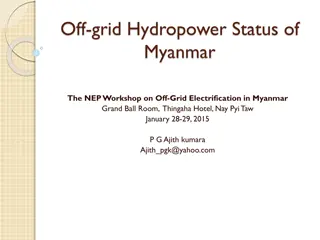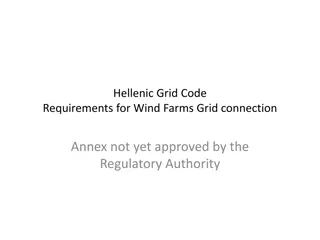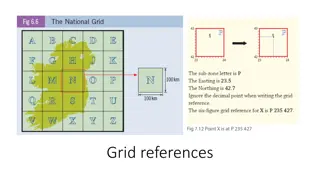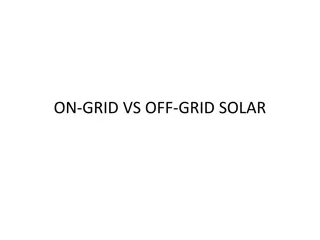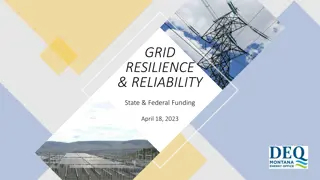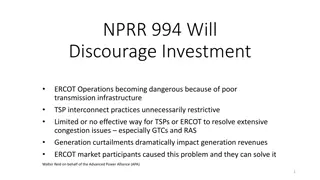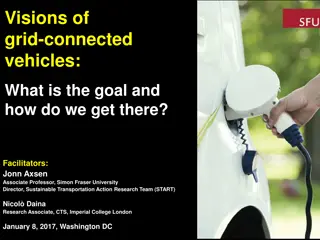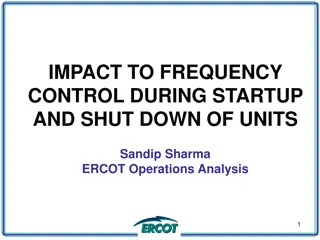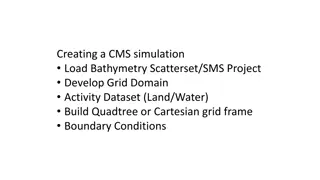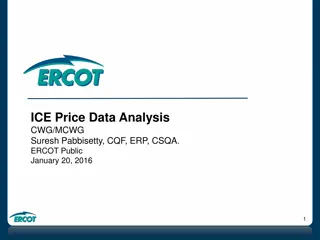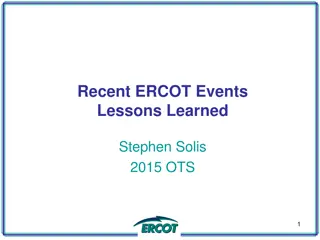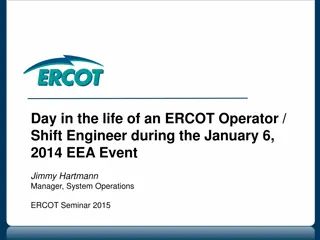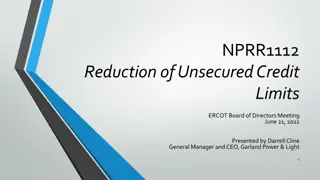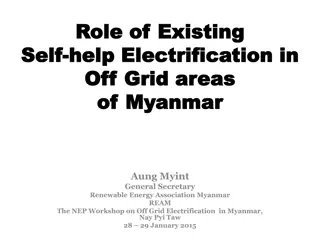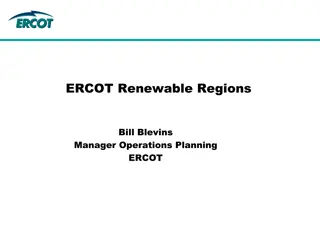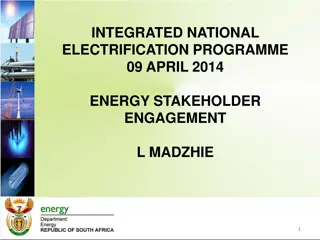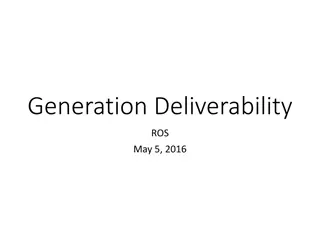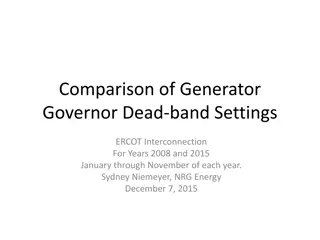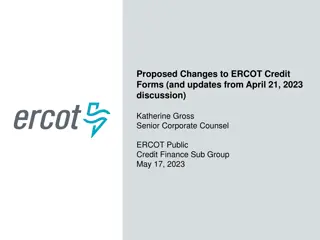Modernizing Energy Infrastructure for a Sustainable Future
In the current initiative spanning 2024-2028, significant advancements are planned in the deployment of advanced metering infrastructure, grid automation, integrated system planning, data analytics for clean energy, and market services. These activities aim to enhance grid visibility, operational ca
4 views • 10 slides
ERCOT CONE Study: Reference Technology Selection for Thermal Dispatchable Plant
The ERCOT CONE study focuses on selecting a reference technology for a thermal dispatchable plant in ERCOT, providing a basis for Cost of New Entry (CONE) calculations. The study reviews characteristics of existing and upcoming plants to determine the preferred technology. The proposed specification
3 views • 21 slides
Design and Implementation of Pilot of a TVET Renewable Energy Course
Explore the world of grid-tied inverters in the context of renewable energy education. Learn about their basic operation, types, and applications in connecting power sources to the grid. Discover the essential rules and standards established by organizations like IEEE and UL for safe and efficient g
7 views • 124 slides
ERCOT Resource Integration Recommendations for Quarterly Stability Assessment
ERCOT's Resource Integration Working Group, led by Jenifer Fernandes, outlines important guidelines and deadlines for Quarterly Stability Assessments (QSA) and synchronization of generation resources. The group emphasizes the proper planning and review processes to ensure the reliability of the grid
4 views • 13 slides
ERCOT Updates and Revision Requests Overview
In this report, updates and highlights from recent ERCOT meetings and workshops are presented. It covers topics such as settlement stability reports, unregistered DG reports, upcoming WMS meetings, and revision requests tabled for review. The content delves into deep dive reviews of ECRS deployment,
1 views • 9 slides
ERCOT Resource Adequacy Analysis Overview
ERCOT's resource adequacy analysis involves multiple aspects such as Capacity, Demand, and Reserves Report status, NPRR submissions, ELCC definitions, and MORA tabs detailing risk assessment and historical trends. The analysis covers upcoming changes in methodologies, seasonal release schedules, and
1 views • 13 slides
ERCOT Cone Study Draft Overview
The ERCOT Cone Study Draft, prepared by The Brattle Group for ERCOT, presents an in-depth analysis of the Cost of New Entry (CONE) for different energy technologies in the Texas market. The study includes detailed cost estimates, reference technology characteristics, and alternative technology analy
0 views • 28 slides
ERCOT Resource Integration Updates - Planning and Submission Guidelines
Stay updated with important ERCOT resource integration topics including Quarterly Stability Assessment (QSA) guidelines, commissioning checklist submissions, dynamic model reviews, and more for efficient planning and compliance. Ensure timely submission and adherence to requirements outlined by ERCO
0 views • 15 slides
Enhancing ERCOT's Capacity Assessment with Demand Response Monitoring
Demand response in ERCOT has been increasing, with forecasts of continued growth. The system operator can identify MW peaks by analyzing total ERCOT load data. A proposed Demand Response Monitor would assist in predicting future capacity needs based on responses from loads like LMP energy prices and
0 views • 7 slides
Understanding Potential Uplift Interpretation in ERCOT Protocols
ERCOT's Potential Uplift Interpretation Protocol defines Potential Uplift as the potential uplift to the Counter-Party based on short payments. The protocol outlines calculations and clarifies language ambiguity to ensure accurate interpretation. ERCOT seeks market feedback for further clarification
1 views • 6 slides
Updates and Discussions on ERCOT NPRRs and NOGRRs
ERCOT Operations Working Group (OWG) discussed various NPRRs (Nodal Protocol Revision Requests) like NPRR1084, NPRR1085, NPRR1100, NPRR1118, as well as NOGRR (Nodal Operating Guide Revision Requests) NOGRR215 and NOGRR226. The group reviewed comments, concerns, and recommendations related to resourc
5 views • 9 slides
Understanding Emergency Conditions in ERCOT Protocols
ERCOT has defined various levels and communication protocols for Emergency Conditions within the electrical grid system. This includes Emergency Notices, Energy Emergency Alerts, operating plans, outage coordination, and requirements related to voltage support for ensuring system safety and reliabil
6 views • 18 slides
ERCOT Supply Analysis Working Group February 2022 Update Report
The Supply Analysis Working Group (SAWG) updated the ERCOT committee in February 2022 on various aspects including long-term load forecast discussions, reductions in load forecasts due to COVID impacts, rooftop PV forecasts, and the December 2021 CDR review highlighting a drop in summer 2022 reserve
0 views • 8 slides
Understanding ERCOT Default Uplift and Payment Procedures
ERCOT's default uplift and payment procedures involve handling short-paying invoice recipients, implementing payment plans, and collecting total short pay amounts from QSEs and CRRAHs. Default uplift invoices may be issued after 90 days of a short pay, with a maximum cap of $2.5 million per monthly
0 views • 7 slides
ERCOT 2015 Updates and Enhancements
ERCOT implemented changes in the Market System in 2015, including the removal of NPRR568 Phase 2 and adjustments to various pricing elements. The Settlement System also underwent updates throughout the year. These modifications aimed to enhance reliability and efficiency in ERCOT operations.
0 views • 17 slides
ERCOT Congestion Management Working Group Updates
The Congestion Management Working Group discussed impacts of NPRR 1111 and SCR 819, nodal settlement of Controllable Load Resources, CRR Activity Calendar updates, and reduced locked credit since implementation of NPRR867. ERCOT aims to enhance grid efficiency and pricing mechanisms through ongoing
0 views • 7 slides
Understanding ERCOT SOL Methodology and NERC Standards
Explore the ERCOT SOL Methodology for Planning and Operations Horizons as outlined by Stephen Solis in 2014. Learn about System Operating Limits, Interconnection Reliability Operating Limits, and the relationship between ERCOT and Transmission Planners/Operators. Discover the purpose, changes made,
0 views • 33 slides
Overview of Off-Grid Hydropower Status in Myanmar
The NEP workshop on Off-Grid Electrification in Myanmar held in Nay Pyi Taw in 2015 shed light on various off-grid hydropower projects in different states of Myanmar. The projects range from small-scale individual setups to larger community-based initiatives, showcasing a mix of private, government-
0 views • 44 slides
Requirements for Grid Connection of Wind Farms in Hellenic Grid Code
The Hellenic Grid Code outlines the specific requirements for wind farms regarding grid connection, including frequency and voltage operation boundaries, active/reactive power boundaries, voltage/reactive power control, and load-frequency control. These requirements ensure the safe and efficient int
0 views • 6 slides
Grid References and Archaeological Sites Answer Key
This content provides answers to grid references for various archaeological sites, including a four-figure grid reference and a six-figure grid reference. The images and descriptions help in understanding the locations of sites like Holy Well, Cairn, Megalithic Tomb, Standing Stone, and more. The so
0 views • 5 slides
Understanding On-Grid vs Off-Grid Solar Systems
On-grid solar systems are connected to the utility grid, providing backup power and maximum reduction of utility diesel use. Off-grid systems, while offering independence, may increase operational complexity. Standards and battery integration can mitigate disadvantages. Co-generation with solar bene
0 views • 20 slides
Grid Resilience and Reliability Funding Provisions under Infrastructure Investment and Jobs Act
This content outlines the significant funding allocations for grid resilience and reliability programs as part of the Infrastructure Investment and Jobs Act (IIJA). The Act provides over $60 billion for the Department of Energy (DOE) to support various initiatives such as domestic manufacturing, ene
0 views • 12 slides
Challenges in ERCOT Transmission Infrastructure & Operations
Poor transmission infrastructure and restrictive interconnect practices in ERCOT are leading to dangerous operations, congestion issues, and generation revenue impacts. Concerns include increased RAS proposals, challenges with GTC management, and minimalist interconnect processes. The need for impro
0 views • 9 slides
ERCOT Congestion Management Working Group Updates
The ERCOT Congestion Management Working Group discussed various topics such as reviewing constraint management processes, implementing the Not-to-Exceed method for efficient control of GTCs, and analyzing congestion at the cap during a recent event. The group aims to improve processes, reduce transm
0 views • 7 slides
Workshop on Vision of Grid-Connected Vehicles and Vehicle-Grid Integration
This workshop, led by Jonn Axsen and Nicol Daina, explores the visions and strategies for grid-connected vehicles and vehicle-grid integration. It delves into the benefits, risks, societal implications, and policy requirements of various VGI visions. Experts discuss consumer perceptions, business pr
0 views • 24 slides
Optimizing Firm Fuel Supply Service Deployment in ERCOT
ERCOT is considering a revised approach to providing Firm Fuel Supply Service (FFSS) from individual Generation Resources through an RFP process. The proposal involves setting a minimum Load Serving Limit (LSL) to ensure the deployment of a specific amount of service and allocating FFSS based on sys
0 views • 9 slides
ERCOT Operations Analysis: Impact of Frequency Control During Unit Startup and Shutdown
This presentation by Sandip Sharma discusses ERCOT's expectations regarding resource entities and QSEs during the startup and shutdown of units, emphasizing the importance of proper procedures to avoid performance issues, base point deviation charges, and system-level frequency deviations. The objec
0 views • 28 slides
Creating a CMS Simulation: Grid Domain Activity Dataset Development
Developing a CMS simulation involves loading bathymetry data, setting boundary conditions, creating grid domains (land/water), and choosing between Quadtree or Cartesian grid structures. Learn how to manage survey datasets, add new coverages, define grid frames, and set up the land/water interface f
0 views • 14 slides
ICE Price Analysis for ERCOT Credit Risk Exposure
CWG/MCWG is exploring the use of ICE futures prices to assess ERCOT's credit risk exposure. This involves analyzing the relationship between ICE prices and actual RTM prices. The data inputs and transformations include calculations of daily average prices, logarithmic adjustments for linear regressi
0 views • 22 slides
Lessons Learned from Recent ERCOT Events in 2014
Explore the beneficial actions taken by Transmission Operators during Energy Emergency Alerts in ERCOT, specifically during the events on January 6, 2014. Review the timeline of events, generation outages, and cold weather-related outages impacting energy availability. Gain insights into communicati
0 views • 31 slides
A Glimpse into an ERCOT Operator's Role During the January 6, 2014 EEA Event
Amid freezing conditions and generation resource challenges, ERCOT operators responded to an emergency on January 6, 2014, leading to the declaration of Energy Emergency Alerts. This snapshot showcases the critical tasks and decisions made by ERCOT personnel during this event.
0 views • 37 slides
Reduction of Unsecured Credit Limits at ERCOT Board Meeting
ERCOT is considering reducing the unsecured credit limit from $50M to $30M based on recommendations from various committees. This reduction aims to bring down outstanding unsecured credit from $1.4B to $400M. Market participants support this move, which would make ERCOT's limit the lowest among ISO/
0 views • 5 slides
Challenges and Solutions for Electrification in Off-Grid Areas of Myanmar
Myanmar is in the midst of a significant policy transformation to enhance development across all sectors, including energy. The country aims to increase electrification from 30% to 100% by 2030, facing challenges due to its vast off-grid areas and economic feasibility issues. Implementing proper pla
0 views • 17 slides
Analysis of NPRR 784 Impact on ERCOT Market Design
NPRR 784 proposes changes to how Reliability Must Run (RMR) units are priced in noncompetitive scenarios due to transmission constraints in ERCOT. This proposal is argued to be inconsistent with the market design, potentially punitive to customers, and limiting ERCOT's ability to maintain reliabilit
0 views • 7 slides
Overview of ERCOT Renewable Regions and Zone Map
ERCOT, managed by Bill Blevins, divides into seven solar and wind regions including North, South, East, West, Panhandle, Coast, and Houston. This division aids operations planning and management. The Renewable Regions Map and Zone Map play key roles in GIS status reporting and meeting presentations,
0 views • 4 slides
Integrated National Electrification Programme Overview
The Integrated National Electrification Programme (INEP) in South Africa has made significant progress in connecting over 5.8 million households to the grid between 1994 and February 2014. Additionally, more than 75,000 households have benefited from non-grid electricity, mainly through solar home s
0 views • 9 slides
Evolution of Generation Deliverability Criteria in ERCOT
ERCOT's journey towards enhancing generation deliverability criteria involves requests for transmission planning considerations, workshops on tool development, and discussions on economic criteria revisions. The focus is on addressing generation constraints at peak load conditions and assessing the
0 views • 7 slides
Comparison of Generator Governor Dead-band Settings in ERCOT Interconnection
This report compares the generator governor dead-band settings in the ERCOT Interconnection for the years 2008 and 2015 from January to November. It outlines the changes in the dead-band settings over the years, including the requirements for proportional response, improvements in primary frequency
0 views • 17 slides
Proposed Changes to ERCOT Credit Forms - Update and Revision Details
Detailed updates and proposed changes to ERCOT credit forms including Letter of Credit, Surety Bond, and Guarantee Agreements discussed by Katherine Gross, Senior Corporate Counsel at ERCOT. The elimination of Guarantee Agreements due to regulatory changes and adjustments to Letter of Credit and Sur
0 views • 5 slides
Enhancing UFLS Strategies for Improved Grid Reliability
Addressing the challenges in underfrequency load shedding (UFLS) strategies, the proposal suggests extending obligations to all loads, emphasizing compliance with ERCOT protocols. It highlights the need for a holistic approach to emergency load shedding procedures and discusses the limitations of cu
0 views • 7 slides
